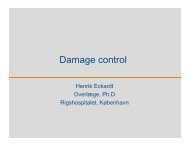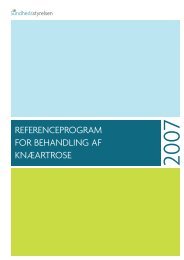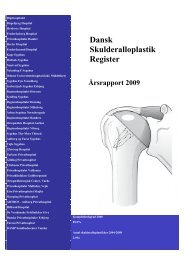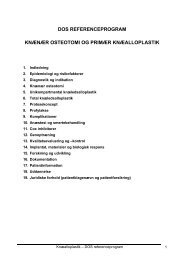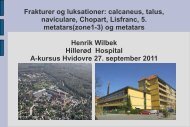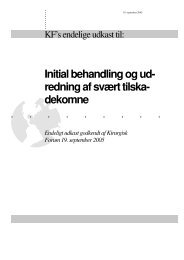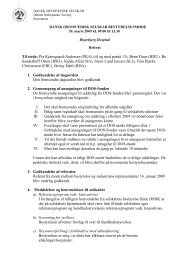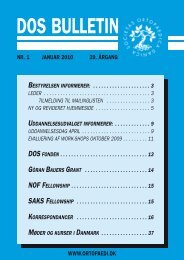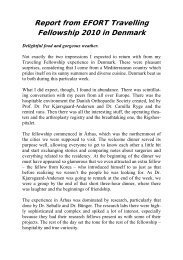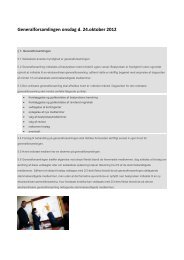DOS BULLETIN - Dansk Ortopædisk Selskab
DOS BULLETIN - Dansk Ortopædisk Selskab
DOS BULLETIN - Dansk Ortopædisk Selskab
You also want an ePaper? Increase the reach of your titles
YUMPU automatically turns print PDFs into web optimized ePapers that Google loves.
2010-378_<strong>DOS</strong> nr. 3 2010 29/09/10 10:08 Side 80<br />
Risk of revision following Oxford<br />
unicompartmental knee arthro-plasty<br />
Lars Solgaard, Lars Peter Møller, Torben Sandberg<br />
Orthopaedic Clinic, Frederiksberg Hospital<br />
Background: Unicompartmental arthroplasty is still a controversial<br />
issue in knee replacement.<br />
Purpose: The aim of this study was to analyse possible risk factors for<br />
revision following Oxford unicompartmental knee arthroplasties<br />
(OUKA).<br />
Methods: Since 1997 data for all patients with primary and revision<br />
knee arthroplasties performed in our department have been stored in a<br />
database. Selected for the present study was all primary OUKA performed<br />
in the period 1997-2006 as well as any revision following these<br />
operations until the end of 2008. We got information from The National<br />
Health Register and the CPR register about any revision performed at<br />
other institutions and date in case of death. Primary OUKA were<br />
grouped in three categories according to the experience of the surgeon:<br />
1 for operation done by a surgeon who had performed less than 20<br />
OUKA, 2 for operation by a surgeon who had performed 20-40, and 3<br />
for operation by a surgeon who had performed more than 40. Risk of<br />
revision was analysed by Cox regression. Revisions due to pain as the<br />
only reason were excluded from the analyses.<br />
Findings: 445 primary Oxford knee arthroplasties were included. These<br />
were followed by 46 revisions, and for 11 cases the reason for the revision<br />
was pain. Operation time was correlated to risk of revision with<br />
decreasing risk with increasing operation time (p=0,001). The experience<br />
of the surgeon was also correlated to risk of revision with decreasing<br />
risk with increasing experience (p=0,02). The 6 years survival rate<br />
for an experienced surgeon using an operation time at 90 min. or more<br />
was 97,5 % compared to a survival rate at 78,7 % for an inexperienced<br />
surgeon with an operation time less than 90 min.<br />
Conclusion: OUKA performed by an inexperienced surgeon and<br />
OUKA performed with short operation time had marked reduced survival<br />
rates. This seems to be an essential information to institutions performing<br />
OUKA.<br />
80



